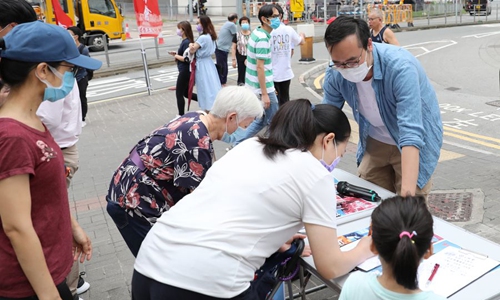UK should abandon double standards on Hong Kong: FM spokesperson
Source:Globaltimes.cn Published: 2020/6/10 1:46:44

Citizens write down their signatures in a street campaign in support of the national security legislation in Hong Kong, South China, May 22, 2020. Photo: Xinhua
What kind of freedom did the UK give to Hong Kong during its 156 years of colonialism, Chinese Foreign Ministry spokesperson Hua Chunying asked Tuesday at a press conference in response to the UK's expression of concern over the freedom of Hong Kong residents following the approval of the introduction of the new national security law.
During the 156 years under British colonial rule, did Hong Kong residents ever enjoy any democracy or freedom? Was any of the former 28 Hong Kong governors elected by the Hong Kong residents? Also, during the UK's colonial rule, the British Treason Act was applied in Hong Kong, Hua noted.
The Hong Kong Special Administrative Region is part of China, so is there any problem for China's National People's Congress to legislate for the city to safeguard national security, Hua asked, calling on the UK side to abandon double standards and understand the situation clearly.
Hua's remarks came after UK Foreign Secretary Dominic Raab said recently that the proposed national security law for Hong Kong would undermine the existing commitments to protect the rights and the freedoms of Hong Kong residents.
According to Hua, Chinese Foreign Minister Wang Yi reiterated China's stance on issues related to the Hong Kong national security law, stressing that Hong Kong affairs are China's domestic affairs and any interference from outside is not allowed.
The Chinese central government authorized the Hong Kong Special Administrative Region to enact laws to safeguard national security through Article 23 of the Basic Law, and this does not change the fact that safeguarding national security is within the purview of the central authorities, Wang said, according to a statement released on the Chinese Foreign Ministry website.
In face of the damage and threats to national security in Hong Kong, the proposed national security law would help to plug the loopholes in the Hong Kong legal system, Wang noted.
Wang stressed that the law is aimed at punishing pro-Hong Kong independence activists and terrorists. It will better protect normal Hong Kong residents' rights and freedom as well as making all law-abiding foreigners feel more at ease working and living in the city.
He called on the UK side to respect China's Constitution and the Basic Law enacted in accordance with the Constitution, respect China's legitimate right to safeguard national security on its territory, and respect the Chinese central government's administration of Hong Kong under the "one country, two systems" principle.
Global Times
Posted in: DIPLOMACY